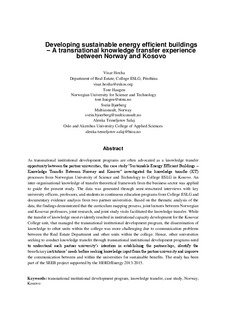| dc.contributor.author | Hoxha, Visar | |
| dc.contributor.author | Haugen, Tore | |
| dc.contributor.author | Bjørberg, Svein | |
| dc.contributor.author | Temeljotov Salaj, Alenka | |
| dc.date.accessioned | 2017-04-26T12:28:10Z | |
| dc.date.available | 2017-04-26T12:28:10Z | |
| dc.date.created | 2016-06-13T14:29:37Z | |
| dc.date.issued | 2016 | |
| dc.identifier.citation | Raportti (Tampereen teknillinen yliopisto. Rakennustuotanto ja -talous). 2016, 5 715-727. | nb_NO |
| dc.identifier.issn | 1797-8904 | |
| dc.identifier.uri | http://hdl.handle.net/11250/2440942 | |
| dc.description.abstract | As transnational institutional development programs are often advocated as a knowledge transfer opportunity between the partner universities, this case study “Sustainable Energy Efficient Buildings –Knowledge Transfer Between Norway and Kosovo” investigated the knowledge transfer (KT) processes from Norwegian University of Science and Technology to College ESLG in Kosovo. An inter-organisational knowledge of transfer theoretical framework from the business sector was applied to guide the present study. The data was generated through semi-structured interviews with key university officers, professors, and students in continuous education programs from College ESLG and documentary evidence analysis from two partner universities. Based on the thematic analysis of the data, the findings demonstrated that the curriculum mapping process, joint lectures between Norwegian and Kosovar professors, joint research, and joint study visits facilitated the knowledge transfer. While the transfer of knowledge most evidently resulted in institutional capacity development for the Kosovar College unit, that managed the transnational institutional development program, the dissemination of knowledge to other units within the college was more challenging due to communication problems between the Real Estate Department and other units within the college. Hence, other universities seeking to conduct knowledge transfer through transnational institutional development programs need to understand each partner university’s intention in establishing the partnerships, identify the beneficiary institutions’ needs before seeking knowledge input from the partner university and improve the communication between and within the universities for sustainable benefits. The study has been part of the SEEB project supported by the HERD/Energy 2013-2015. | nb_NO |
| dc.language.iso | eng | nb_NO |
| dc.publisher | TUT Tampere University of Technology | nb_NO |
| dc.title | Developing sustainable energy efficient buildings – A transnational knowledge transfer experience between Norway and Kosovo | nb_NO |
| dc.type | Journal article | nb_NO |
| dc.type | Peer reviewed | nb_NO |
| dc.source.pagenumber | 715-727 | nb_NO |
| dc.source.volume | 5 | nb_NO |
| dc.source.journal | Raportti (Tampereen teknillinen yliopisto. Rakennustuotanto ja -talous) | nb_NO |
| dc.identifier.cristin | 1361192 | |
| cristin.unitcode | 194,61,15,0 | |
| cristin.unitname | Institutt for byggekunst, prosjektering og forvaltning | |
| cristin.ispublished | true | |
| cristin.fulltext | postprint | |
| cristin.qualitycode | 1 | |
